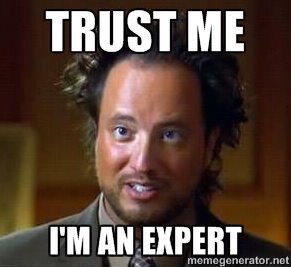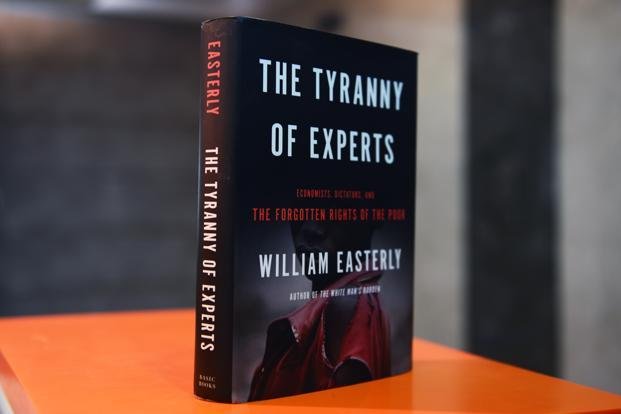What Economists Don’t Want You to Know, and How Steemit and Cryptocurrencies Prove Them Wrong
How many times have you heard someone say, "I can't understand this [...] it's too difficult [...] let's just have the experts deal with it"?

And how many times the subject matter was Economics, Fiscal Policy, or Monetary Policy?
We're told we should leave it to the experts, and yet often times the problems we find ourselves in were created by these very "experts", who now pontificate on what we should do. How ironic.
We have an intuitive grasp of many things in life. Economics is certainly not an easy subject, but behind the curtain of the obscure language of derivatives and quantitative easing, there are actually some pretty simple concepts that everyone can understand and should be familiar with.
And this is what Ha-Joon Chang, leading Economist who consulted for the World Bank, the Asian Development Bank, the European Investment Bank, Oxfam and various United Nations agencies, is arguing in this video.
Chang dispels the notion that Economics should be relegated to experts and explains why every single person can and SHOULD get their head around basic economics.
This is also the main argument of a book by William Easterly, Professor of Economics at New York University who specializes in economic development and who wrote The Tyranny of Experts: Economists, Dictators, and the Forgotten Rights of the Poor.

We're told that, unless we are university professors who authored many papers, we couldn't begin the understand monetary policy, the fractional reserve system, let along implement one.
AND YET, HERE WE ARE
We're learning, w're testing, we're trying. With blockchain and cryptocurrencies, we're essentially running a real-life experiment in monetary policy, without governments, red tape, and years of waiting for permission.
We have an idea, we implement it, we test it. And we improve.
I'm very curious to see how the Steemit Economy will evolve.
The truth is that many Economists simply do not understand the mathematics driving decisions. If they did, they wouldn't expect perpetual growth on a finite planet as a possibility.
-- Sir David Attenborough
This is a good reason to stock up on bitcoins and ripple XRP
For what it's worth, as a person who's rubbed shoulders with a number of economists, I'd say that the economists understand the mathematics better than most people. If economists have a fault, it's that they understand the math too well - and are are blinded by it to the point that they cannot see the people whose decisions their math is supposed to predict.
PhD's in economics are really more applied math degrees. You need not have ever taken an economics class to get into a program nor do you have to demonstrate basic theory to teach an undergad econ course. The textbook publisher will give you everything you need.
T o put it another way, there is little regard for understanding the processes that actually drive the phenomenon economists are trying to study. Observation, that is practical experience or spending time intimately outside the office with the subject matter, isn't valued. Being able to publish is what is most valued among academia.
To note, there is no Steem economics any more than a black economics or a white economics or what have you. The basics of supply and demand never change. The problems created by a centrally planned economy and monetary policy are the same. Rent seeking is rife in crypto and so on and so forth. The standard theories that are present in introductory textbooks hasn't changed in decades. What has change is they put a little more math in there and a lot more color pictures.
How long is a piece of string? The thing is... exponential growth does happen, you only have to look at technology and Moore's Law to see that. Network effects do happen... "Viral things" do happen on the internet.
It's just a matter of figuring out where to take them so they don't blow up in our faces!
Experts are not all that useful if their skin is not fully in the game :)
https://steemit.com/liberty/@marco555/the-imminent-tax-on-crypto-thoughts-evidence-and-opinions
As a "young" economist, I can say that Steemit has one of the best Economies at the moment according to my current observation. They took all the "things" that bank's kept hidden or covered in "scientific terms"that are hard to understand by the public and fixed them. The only flaw in a system like this, are we, people. The system is perfect (to my opinion) but people aren't. We are the ones that will influence the future of this system and it's outcome.
The Wizard of Oz behind the curtain is literally the symbol for that (read in the web about what the author was trying to say with the whole story).
We're removing the curtain.
hahahahaha :-D
There is a very good speech from William Easterly.
I work at a university and am surrounded by economists daily. Most of them are brilliant people, but I can also tell you that a lot of them don't fully grasp very "basic" subjects.. Mostly when it comes down to the math behind them. I would recommend anybody to keep a healthy stance towards any topic in life and do his or her own research on as many things as possible!
Your comment about a lack of basic maths understanding promotes a theory I have - thanks.
I'm curious what you mean by "the math behind them." Could you give an example of what you're talking about?
What if this is not experiment, but attempt to produce initial parameters for solar system economy ?
Let's start building a Dyson sphere
I am so down with this idea. Let's make it happen.
So, please forgive any potential crudeness, but isn't your point that we shouldn't trust experts? If so, why should we then trust this one?
and this one...
Why point out that these two people are experts in an attempt to persuade us from believing in experts? If Dr. Easterly's book successfully proves that all experts are tyrants, why should we trust that he isn't tyrannical himself?
It seem you are on to something here, but your methodology may contradict the very point you are trying to make.
nice article